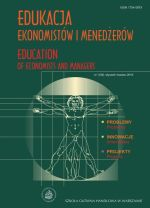Treść głównego artykułu
Abstrakt
This article presents, in a very brief way, contemporary expectations towards economists, whose theories should find practical implementation in a business world. It treats about the role of case studies in confrontation of economic theories with practice. The study describes main principles of case studies implementation, construction and generalization of conclusions based on them. The article also shows main advantages and disadvantages of “traditional” research methods confronting theories with practice through empirical implementation of results, like experiment, survey, source and historical analysis.
Szczegóły artykułu
Autor (Autorzy) artykułu oświadcza, że przesłane opracowanie nie narusza praw autorskich osób trzecich. Wyraża zgodę na poddanie artykułu procedurze recenzji oraz dokonanie zmian redakcyjnych. Przenosi nieodpłatnie na Oficynę Wydawniczą SGH autorskie prawa majątkowe do utworu na polach eksploatacji wymienionych w art. 50 Ustawy z dnia 4 lutego 1994 r. o prawie autorskim i prawach pokrewnych – pod warunkiem, że praca została zaakceptowana do publikacji i opublikowana.
Oficyna Wydawnicza SGH posiada autorskie prawa majątkowe do wszystkich treści czasopisma. Zamieszczenie tekstu artykuły w repozytorium, na stronie domowej autora lub na innej stronie jest dozwolone o ile nie wiąże się z pozyskiwaniem korzyści majątkowych, a tekst wyposażony będzie w informacje źródłowe (w tym również tytuł, rok, numer i adres internetowy czasopisma).
Osoby zainteresowane komercyjnym wykorzystaniem zawartości czasopisma proszone są o kontakt z Redakcją.
![]()
Referencje
-
1. Cook, T.D., Campbell, D.T., Quasi – experimentation: Design and analysis issues forfields settings, Rand McNally, Chicago 1979.
2. Eisenhardt, K.M., Building Theories from Cases, “The Academy of ManagementReview” 1989, Vol.14, No 4.
3. Hillebrandt B., Kok R.A., Biemans, W.G., Theory – Testing Using Case Studies,“Industrial Marketing Management” 2001, Vol 30.
4. Jabłonowska L., Metoda przypadku w zapewnieniu jakości kształcenia menedżerów,„Edukacja ekonomistów i menedżerów. Problemy. Innowacje. Projekty” 2011,nr 1(19) styczeń-marzec.
5. Lakatos I., Renesans empiryzmu we współczesnej filozofii matematyki?, w: Współczesnafilozofia matematyki, red. R. Murawski, PWN, Warszawa 2002.
6. Lijphart A., Comparative politics and the comparative method, “American PoliticalScience Review” 1971, 65.
7. Nissen S., The Case of Case Studies: On the Methodological Discussion in ComparativePolitical Science, “Quality & Quantity” 1998, Vol. 32.
8. Popper, K.R., Logika odkrycia naukowego, PWN, Warszawa 2002.
9. Yin, R., Case Study Research, CA: Sage Publications, Beverly Hills 2003.
Referencje
2. Eisenhardt, K.M., Building Theories from Cases, “The Academy of ManagementReview” 1989, Vol.14, No 4.
3. Hillebrandt B., Kok R.A., Biemans, W.G., Theory – Testing Using Case Studies,“Industrial Marketing Management” 2001, Vol 30.
4. Jabłonowska L., Metoda przypadku w zapewnieniu jakości kształcenia menedżerów,„Edukacja ekonomistów i menedżerów. Problemy. Innowacje. Projekty” 2011,nr 1(19) styczeń-marzec.
5. Lakatos I., Renesans empiryzmu we współczesnej filozofii matematyki?, w: Współczesnafilozofia matematyki, red. R. Murawski, PWN, Warszawa 2002.
6. Lijphart A., Comparative politics and the comparative method, “American PoliticalScience Review” 1971, 65.
7. Nissen S., The Case of Case Studies: On the Methodological Discussion in ComparativePolitical Science, “Quality & Quantity” 1998, Vol. 32.
8. Popper, K.R., Logika odkrycia naukowego, PWN, Warszawa 2002.
9. Yin, R., Case Study Research, CA: Sage Publications, Beverly Hills 2003.
